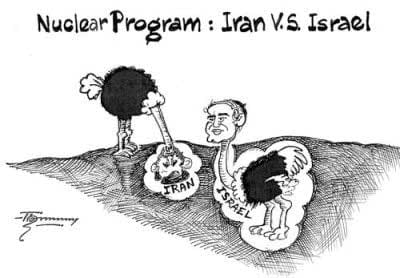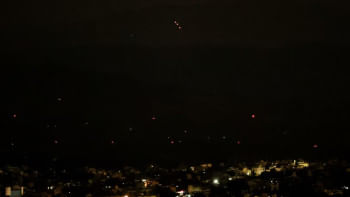Iran or Israel:Who bites hard?

Photo: AFP
The debate around Iran's nuclear program has kept western leaders thinking deeply. While negotiation is still in place the fear of a full-scale war seems plausible. The question of war obviously takes the analysts to look at the potential strength the countries have upon each other. Israel enjoys a strategic advantage over Iran having scores of nuclear weapons with long-range delivery means. Iran contrarily makes attempts to strike a balance with undeniable conventional military edge over Israel despite decades-long arms embargo. Is it the hard weapons that only matter in war? Then what about the non-state protégés of Iran? These questions only further complicate the calculation of hawkish Generals in both the United States and Israel.
The war may be undesired to idealists but the reality persists. It may be an argument that the likelihood of Israeli attack on Iranian nuclear sites and counter attack by Iran is over-stated. Global media giants, sympathetic to Israel, might find crucial interests in invoking such war fever. But it is also true that, Israel would prefer war adventure a lot more than the US if no change is visible in Iranian attitude. It profoundly maintains its trust in Darwinian Theory of survival of the fittest. The United States has clarified its position and stated that it won't tolerate nuclear weapons in the hands of revolutionary regime in Iran. Israel's posture better depicts the context of what US hopes to do regarding the issue. Iran is unchanged in its position: nuclear program is peaceful and it is uncompromising in exercising its rights of peaceful use of nuclear technology endorsed by Nuclear Non-proliferation Treaty.
Then what does come next? The US is stiff, Israel is stubborn and Iran is unbendable. When public statements failed to convey the message it was meant for, negotiation still serves as important tool to prevent the conflict to further escalate. Israel told that that it disbelieves in time-consuming negotiation. Benjamin Netanyahu declared military preparedness to attack on Iran. Later, however restrain came not from Israel, but from the United States. Any war with Israel means potential US involvement. In Iran-Israel war, Americans practically see no chance to sell arms to any party; it has to rather supply arms to Israel as aid.
If the ongoing-negotiation fails for any reason, is there any possibility of potential Israeli attack on Iran? If so, can Iran defend itself? Making quick and absolute assumptions will be a mistaken venture. Victory does not depend on military power alone; other factors come across the spectrum. Israel-Hezbollah war in 2006 is an instance. However, despite all factors, it is the military power which plays the crucial role in any kind of war. Iran and Israel both have significant military muscles; but Iran remains far away from Israel in certain strategic areas.
While Iran leads in quantity, Israel outweighs in quality. Iran has a ten times larger population than Israel to draw its armed forces. Report says that it has more than 523,000 personnel on active services including 350,000 in the army, 18,000 in the navy, and 30,000 in the air force along with 12,000 in air defense. On the other hand, in Israel 176,500 personnel are in active duty which makes up of 133,000 in the army, 9,500 in the navy, and 34,000 personnel serving in the air force. But Iran runs backward having only 1, 613 backdated tanks in comparison to Israel's 3000 modern possession. Likewise, sheer number of 3 German-made Dolphin tactical submarines brings Israel superiority in water as they are suspected to be nuclear armed giving it offshore second-strike capability. It means that if attacked on land, it can take counter-attack from the sea denying the enemy the chance to destroy by first strike or go immune. Conversely, Iranian possession of 19 submarines remains inferior to that of Israel in the absence of nuclear weapons and therefore stays far from having second-strike opportunity.
The Israeli air force is called the best air force in the world. It proved its success in 1967 Arab-Israeli war. The possession of 460 combat-capable aircraft, with 168 fighters which also include 27 Boeing F15A Eagle, seven F-15B and 90 F16A Fighting Falcons made Israeli air force invincible in the air. Iran's air force is also not weak in strength. It has 336 combat-capable aircraft, including 189 fighter aircraft like 20-US-made F5B jets, 60 F5E Tiger IIs and Russian-made 35 Mig-29A jets. The primary difference between them lies in attack with precision by Israel. The unmanned drones in possession of Israel will give a clear advantage over Iran.
Iran possesses missiles capability of all three kinds. It currently possesses ballistic missiles and long range artillery rockets which are largest in Middle East. Reportedly it has 1000 strategic missiles, capable of striking throughout the Gulf and beyond. In February 2012, Israeli officials claimed that Iran is developing missiles with range about 6000 miles, able to reach the United States, and is getting ready to produce missiles of 10,000 miles range. But United States denied this claim saying that it is badly exaggerated. America is not ready to recognize that Iran could reach its mainland, because it would add psychological strength to Iranians and its allies. United States say that Iran is working on missiles with medium range of 2,000 miles. If Israel's claim is true, then with a range of 10,000 km, missiles can be fired from Iran to fly halfway around the world to reach the United States, which is for present day Iran a nightmare. On the other hand, by virtue of strategic missile cooperation with United States, the missile capability of Israel is unquestioned. Its ballistic missiles are primarily used as nuclear-weapon delivery system unlike Iran which uses missiles as delivery for conventional warheads. Israel though maintains 'nuclear ambiguity' it is open secret that it already possesses the nuclear weapons. Reportedly it has more than 200 nuclear warheads, the tools that carry nuclear weapon at the tip of missiles. Iran has not only denied having any nuclear weapons produced, but also outright negates the possibility that such program is in the process.
It is clear that while Iran somewhat exercises a conventional edge, Israel's advantage is somewhere else: huge possession of nuclear weapons. But whatever, the superiority of Israel, using nuclear weapon is never a first choice. For Iran's strategic depth, it can absorb more attacks than Israel. The greatest disadvantage of Israel and United States is the lack of accurate information about military might of Iran. However if the Israelis attack Iran, it is true that it won't be able to incur damages as much as it wants. Iran won't remain sitting idle. Israelis will also need to pay much for that. In retaliation, Iran would launch hundreds of missiles at Israel. Would Iran's protégés in Middle East remain apart? Israel has to endure the bites from them too. Iran has more reason to fear the United States than Israel as US presence continues to form strategic envelope encircling Iran. But the greater fear inhabits in the notion that, Iran after absorbing attacks from Israel would finally get a public reason to produce nuclear weapons.

 For all latest news, follow The Daily Star's Google News channel.
For all latest news, follow The Daily Star's Google News channel. 



Comments